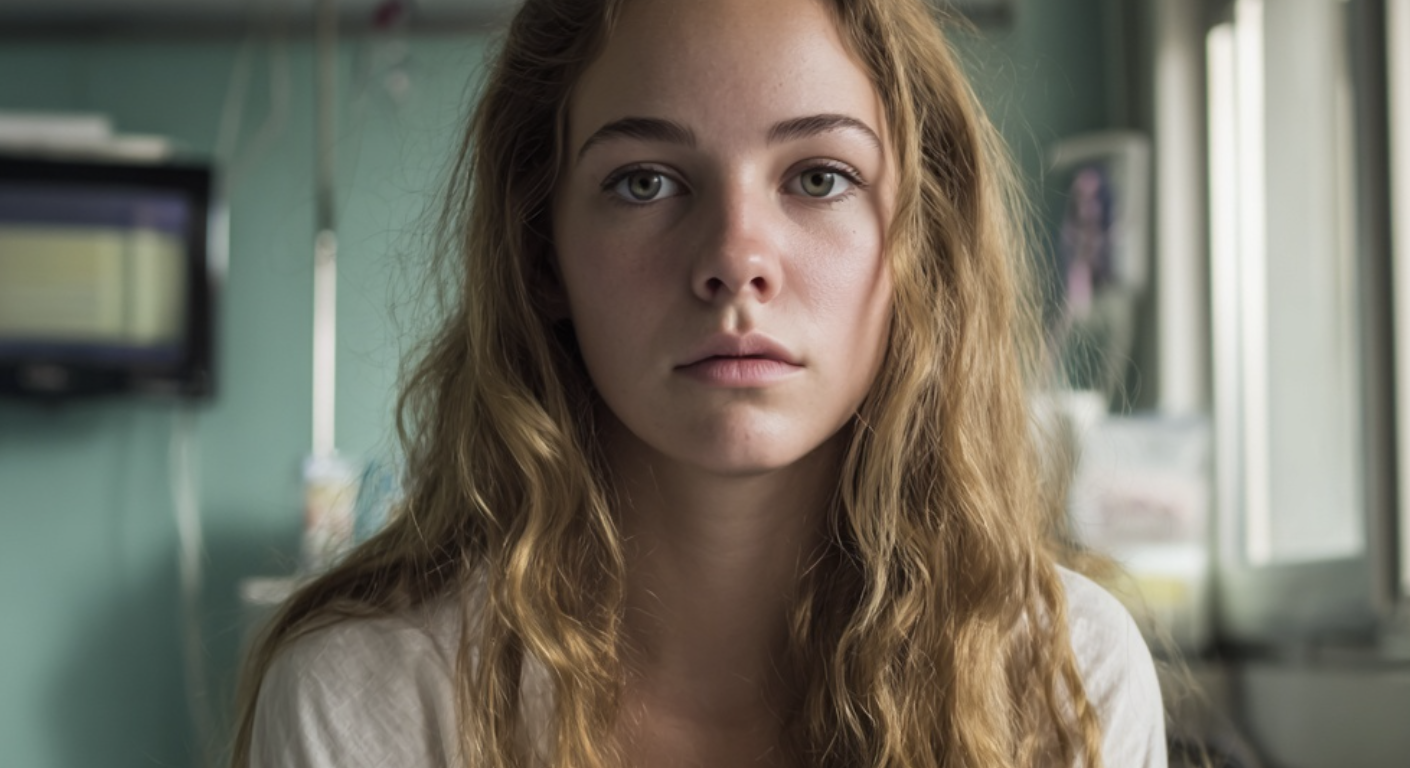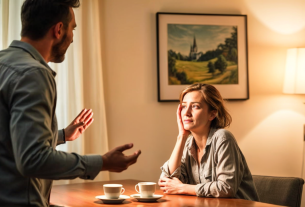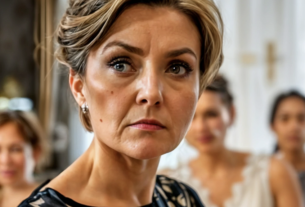I remember that day down to the smallest details: the way a ray of sunlight fell on the white walls of the doctor’s office, the creak of the chair when I tried to stand on trembling legs. The way Dr. Petrova looked at me with concern but without pity—exactly what I needed at that moment.
“Larisa Mikhailovna, I understand this is a shock,” she said quietly. “But we’re going to fight. We have everything we need.”
Breast cancer. Two simple words that turned my life upside down. At forty-seven I thought I knew what hardship was. I’d raised a son, lived through crises in my marriage, lost my parents… But this? This was something else entirely.
I rode home as if in a fog. The bus swayed, people talked about their own affairs, and I sat there unable to believe this was happening to me. What was I supposed to say to Nikolai now? How do you even find the words?
He met me at the door with his usual question:
“So, what did the doctors cook up this time?”
I sat down on the couch, folded my hands on my knees, and looked him in the eyes.
“Kolya, I have cancer.”
He froze. Completely, as if time had stopped. Then he slowly sank into the armchair opposite.
“What… what do you mean, cancer?”
“Breast cancer. The doctor says I have a chance if we start treatment right away…”
After that came silence. A long, oppressive silence that seemed to suck all the air out of the room. Nikolai stared at the floor and said nothing. And I waited… for what? An embrace? Words of support? At least a question about what we should do next?
“Do you want dinner?” he asked at last.
Just like that. As if I’d told him the store was out of milk.
In the days that followed I tried to talk to him about treatment, about the doctors’ plans, about what lay ahead. But each time he found a way to steer the conversation aside. He’d suddenly remember the leaky kitchen faucet, or bury himself in the paper, pretending to be terribly busy.
“Kolya, I have to go to the hospital for tests tomorrow,” I said one evening.
“Hm,” he grunted without taking his eyes off the TV.
“Are you listening to me?”
“I hear you. Go.”
That was it. “Go.” As if I were heading out to buy bread.
I started to notice how he avoided looking at me. How he turned his back when I undressed. How he left the room if the TV showed anything about medicine. As if my illness were contagious and he might catch it.
Evenings were the worst. We lay in the same bed, but a wall had grown between us. Nikolai would turn his back, and I would lie awake for hours listening to him breathe. Did the man I’d lived with for so many years really think that if he just didn’t talk about the illness, it would simply go away?
A week passed. I was holding the papers prescribing chemotherapy and decided to try talking to my husband once more.
“Kolya, look,” I handed him the sheet with the orders. “The doctor drew up a treatment plan. She says if all goes well…”
“Why bother with all this?” he cut me off. “It’s all the same, anyway…”
He didn’t finish. But I understood. God, did I understand.
Something exploded inside me. All the pain, fear, and loneliness of the past days burst out in a single sentence:
“You think treatment is pointless because I’m going to die soon, don’t you?”
The words hung in the air like a slap. Nikolai paled, opened his mouth, but said nothing. And I went on:
“Twenty years, Kolya! Twenty years we’ve been together! And you’ve already buried me, haven’t you? Convenient, I suppose. No need to worry, support me, fight…”
“Lara, I didn’t…”
“Didn’t what? Didn’t think? Didn’t want to? What did you want? For me to just lie down and give up?”
He stayed silent, and I felt everything inside me burning. Anger, hurt, disappointment—all fused into one fiery lump.
“You know what,” I said quietly, “I’m going to get treated. With you or without you. But I will.”
And I went to the bedroom, leaving him alone with his silence.
I didn’t sleep a wink that night. I lay there thinking how strange life is. The illness didn’t just show me that I am mortal. It showed me who I can truly count on.
In the morning I called Tatyana, my coworker and friend.
“Tanya, I need help.”
“What happened?” Her voice turned anxious at once.
I told her everything. The diagnosis, Nikolai’s reaction, that awful conversation.
“Larisa,” she said firmly, “get ready. I’m coming for you. We’re going to my doctor. She’s the best oncologist in the city.”
An hour later we were sitting in the waiting room of a private clinic. Dr. Smirnova turned out to be a woman in her fifties, with attentive eyes and an amazingly calm voice.
“Let’s look at your tests,” she said, studying my chart. “Stage two—but that’s not a sentence. In fact, we have excellent results with similar cases.”
For the first time in days, I felt something like hope.
“What do I need to do?”
“Fight,” the doctor smiled. “And don’t doubt. You have every chance to beat this disease.”
Dr. Smirnova wrote out a detailed plan—what would happen each day, how I would feel, what to be ready for. She patiently answered my endless questions. Most importantly, there was no doubt in her voice that I had a future.
I came home a different person. Not cured—no, there was a long road ahead. But I no longer felt condemned.
Nikolai was sitting in the kitchen, gloomily sipping tea. When he saw me, he looked up.
“Where were you?”
“At the doctor’s. We worked out a treatment plan.”
I put the pages down in front of him. He glanced at them and turned away.
“Kolya,” I said tiredly, “I’m not going to fight with you. I have a more important battle. But know this—I intend to win it.”
In the weeks that followed I lived as if I had two lives. By day—hospital, procedures, tests. Dr. Smirnova was right: the treatment was going better than expected. By evening—home, where Nikolai continued to act as if nothing was happening.
Chemotherapy was harder than I’d imagined. After the first sessions the nausea was so bad it felt like the whole world was turning over. My hair began to fall out in clumps. In the mornings, combing my hair, I looked in the mirror and didn’t recognize the reflection.
But that wasn’t the hardest part. The hardest part was Nikolai’s silence. He saw how bad I felt but didn’t say a single word of comfort. He brought me tea when I was sick, but didn’t even stroke my head. We became strangers living in the same apartment.
Salvation came in a call from Pavel, our son. He’s twenty-five, works in Moscow, and we don’t see each other often. But somehow he had learned about my illness.
“Mama,” he said on the phone, “I’m coming to you.”
“Pavlik, you don’t have to—your job…”
“Mama,” he repeated firmly, “I’m coming.”
He arrived the next day. Grown, serious, but with the same childlike worry in his eyes. He hugged me so tightly I felt the ice that had crusted over my heart these past weeks begin to melt.
“Tell me everything from the beginning,” he asked.
And I did. The diagnosis, the treatment, the doctors. Even about Nikolai—though that was the hardest part.
Pavel listened in silence, then nodded.
“Okay. I’m staying for a month. I’ll drive you to your sessions.”
“Pasha, you have work…”
“Mama,” he took my hands in his, “you’re more important than any job. We’ll manage. Together.”
And we did. Pavel turned out to be amazingly caring. He cooked light soups when I was nauseous. Sat with me during the procedures. Joked when things were at their worst. Bought beautiful scarves when I became self-conscious about my bald head.
“You know, Mom,” he said one day, “you’ve become different.”
“In what way?”
“Stronger. You used to pity everyone, try to please everyone. And now… now you just do what needs to be done. And you don’t apologize for it.”
I thought about his words. Maybe he was right. The illness forced me to reconsider a lot. I no longer wasted energy trying to guess Nikolai’s moods. I didn’t apologize for being sick. I didn’t hide my fatigue or my pain.
Nikolai watched all this from a distance. I saw how he looked at me and Pavel when we came back from the hospital. How he winced when our son told me something funny and I laughed. But to come over, to join the conversation—he didn’t.
After three weeks Pavel had to go back to Moscow.
“Mom, I don’t want to leave you,” he said the day before.
“It’ll be alright, son. You’ve helped me so much. Now I know I’m not alone.”
“Promise you’ll call every day.”
“I promise.”
He hugged me goodbye, and I felt how much stronger our bond had become over these weeks. The illness had taken much from me, but it gave me closeness with my son.
After Pavel left, the apartment became quiet again. But now the quiet didn’t weigh on me. I had learned to be alone with my thoughts, with my illness, with my hope.
The treatment went on. Dr. Smirnova was pleased with the results.
“The tumor is shrinking,” she said at the next appointment. “We’ll keep going just like this.”
I left her office smiling. For the first time in months I allowed myself to think about the future. About what would happen when all this was over. About what I wanted my life to look like.
I walked home on foot, though I was tired. I wanted to breathe the air, look at people, feel part of ordinary life. At the bus stop a neighbor, Aunt Valya, called out to me.
“Larisa! How are you? Haven’t seen you in a while.”
“Everything’s fine, Aunt Valya,” I answered—and was surprised to realize it was true. Not perfect, not easy, but fine.
There was a surprise waiting at home. On the kitchen table lay a package, and beside it a note: “I thought you might be cold. —N.”
I unwrapped it. Inside was a warm wool sweater, soft and cozy. I pressed it to my face and caught a familiar scent—Nikolai’s cologne.
At that very moment he walked into the kitchen. Our eyes met, and I noticed something unfamiliar in his expression. Not sympathy, not fear—something different altogether.
“Thank you,” I said softly.
“You’re welcome,” he murmured, fidgeting a little. “How was it at the doctor’s?”
“Good. The treatment is helping.”
He nodded and was about to leave but stopped in the doorway.
“Lara… I…”
“What?”
“Nothing. Just… take care of yourself.”
It wasn’t an apology, not an explanation. But it was a beginning.
In the weeks that followed something between us started to change. Slowly, almost imperceptibly. He began to ask how the day at the hospital had gone. He bought me fruit I liked. Once he even offered to drive me to a session.
“No need,” I said. “I’m used to going on my own.”
“I know,” he replied. “But maybe you’d like someone to be there?”
I looked at him closely. There was something new in his face—an uncertainty he’d never had. As if he himself didn’t know how to behave, but was trying to find the right way.
“Alright,” I agreed. “Let’s go together.”
We drove in silence, but it wasn’t the grim silence from before. It was calm, almost peaceful. At the clinic entrance he took my hand.
“I’ll wait here,” he said.
“In the car?”
“No. Here, in the lobby.”
And he really did wait. When I came out afterward, he was sitting in a chair with a book in his hands—though whether he was reading was doubtful. As soon as he saw me, he stood and came over.
“How did it go?”
“Fine. We can go home.”
On the way he suddenly said,
“You know, I was thinking…”
“About what?”
“About how we never did make it to the mountains. Remember we wanted to go to the Altai?”
I remembered. We had planned that trip five years earlier but kept putting it off. Work, money—always something.
“I remember.”
“Maybe when you get better… when the treatment’s over… we’ll go?”
I looked at him. Sitting in the car beside Nikolai, I suddenly saw the young man I’d fallen in love with many years ago—the one who dreamed of mountains and believed the best days were still ahead.
“Maybe,” I said.
The hardest stretch of treatment came in midwinter. Winter brought the worst days. The doctor had warned me it would be rough, but I hadn’t imagined how rough. The smell of food alone made me sick. Even drinking water was a trial. I was so weak it felt like getting out of bed was a feat.
Nikolai brought me warm broth in small portions, supported my head during bouts of nausea, and didn’t leave my bedside when the pain kept me from sleeping. We didn’t talk much, but his presence gave me the strength not to give up.
One night, when I felt especially bad, he sat on the edge of the bed and took my hand.
“Lara,” he said quietly, “forgive me.”
“For what?”
“For everything. For being afraid. For leaving you alone when you needed support most.”
I looked at him in the dim light. His voice was shaking.
“I thought… I thought if I didn’t take part in any of this, I’d somehow protect myself from the pain. Stupid, isn’t it?”
“Very,” I agreed.
“I was afraid you’d go anyway, and I couldn’t bear to watch you suffer. But I was a fool. You didn’t give up. And I don’t want to be the one who betrayed you first.”
Tears streamed down his cheeks. I had never seen him cry.
“Kolya…”
“Don’t tell me it’s all right. It’s not all right. I behaved like a coward.”
“Yes, you did,” I said honestly. “But you’re here now.”
He bent over and hugged me carefully, as if he were afraid to break me. I felt him trembling.
“I love you so much, Lara. And I’m so afraid of losing you.”
“I’m afraid too,” I whispered. “But we’ll manage. If we’re together.”
We sat like that until morning, holding each other in the quiet. It wasn’t instant forgiveness—there had been too much pain. But it was a step toward each other. The first real step in many months.
Spring came early that year. When I came out of the clinic one day, the buds were already swelling on the trees. Dr. Smirnova smiled as she looked over my tests.
“Larisa Mikhailovna, I have excellent news for you. The main course of treatment is complete. The tumor is no longer detectable.”
I didn’t grasp her words at first.
“You mean…?”
“I mean you’ve won this battle. We’ll keep you under observation, of course—regular checkups—but the worst is behind you.”
I sat there in her office unable to believe it. Could it be true? Was the nightmare really over?
“May I call my husband?” I asked.
“Of course. And accept my congratulations. You’re a very brave woman.”
I dialed Nikolai with shaking fingers.
“Kolya, it’s me.”
“What happened? Are you crying?”
“It’s good. It’s very good. The doctor said… she said I’ve won.”
Silence on the line. Then his voice, hoarse with emotion:
“Really?”
“Really.”
“I’m coming to get you.”
He showed up half an hour later, rumpled and out of breath. When he saw me, he grabbed me in his arms and spun me around right there in the clinic lobby.
“Easy, easy,” I laughed. “This is a hospital.”
“I don’t care!” He kissed my cheeks, my forehead, my lips. “My wife beat cancer! Do you hear me, everyone? My wife won!”
People in the lobby smiled as they watched us. And I thought about the mysterious paths of fate. The illness could have destroyed our marriage for good, but in the end it bound us tighter than all our previous years together.
We went home and threw a real celebration. Nikolai took a bottle of French champagne from the closet—the one he’d been saving for the most important occasion. We called Pavel—he whooped so loudly into the phone that our neighbors probably thought there was a fire. Tatyana called, Aunt Valya, my coworkers.
That evening, when we were alone again, Nikolai said,
“Remember what I said about the mountains?”
“I remember.”
“Well, I’ve already bought the tickets. For the day after tomorrow.”
“Seriously?”
“As serious as it gets. Time to make dreams come true while we have time.”
I looked at myself in the mirror. My hair had only just begun to grow back, sticking up in funny little feathers. I was thin, pale, not very pretty. But there was a fire in my eyes I hadn’t seen in a long time.
“All right,” I said. “Let’s go to the mountains.”
The trip exceeded all my expectations. We stayed in a cozy wooden cabin among the slopes, breathed crystal-clear air, wandered along winding trails, and made plans for the future. For the first time in many months, thoughts of illness, procedures, and medicines completely left my head.
One dawn we climbed a low peak to watch the first rays of the sun. We sat on the rocks wrapped in a blanket and watched the mountains turn pink.
“It’s beautiful,” I said.
“Very,” Nikolai agreed. Then he added quietly, “You know what I realized these past months?”
“What?”
“That we spend too much time on foolish things. On grudges, on silence, on fears. Life is short. We need to cherish every day.”
I took his hand.
“You’re right. But you know what? We still have time to set things right.”
We sat and looked at the mountains, at the sky, at a world that seemed vast and beautiful. I thought about the road I had walked in recent months. About the pain, the fear, the loneliness. But also about the strength I’d found in myself. About my son’s love. About how Nikolai had found his way back to me after all.
“Kolya,” I said, “do you remember that thing you said back then? That it was pointless to get treated?”
He flinched.
“Lara, don’t…”
“No, I need to say this. Treatment always makes sense. Not just for illness. Treatment for fear, for pride, for loneliness. We’ve been treating ourselves too these past months. And it seems we’ve recovered.”
He kissed my temple.
“We have,” he agreed. “And now we’ll take care of this health.”
The sun rose higher, and the day promised to be warm and clear. I felt ready for a new life—the kind that begins not from the fear of death, but from love for each day you live.
We walked down from the mountain holding hands. A long road home lay ahead, but now we were walking it together. And that was what mattered most.



